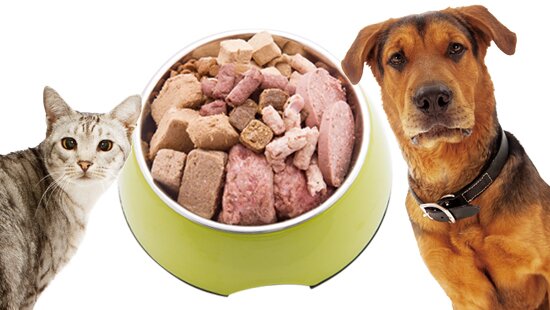The popularity of feeding cats and dogs with raw or undercooked pet food is on the rise in recent years as owners believed that the claimed natural ingredients would improve skin and coat appearance of their beloved pets, and the pets can live healthier and longer lives. However, the Consumer Council tested 17 models of raw and undercooked pet food and found that 3 frozen raw pet food samples contained Salmonella, which poses potential health risks to pets, and possibly for pet owners to be infected.
The health organisations and veterinary medical associations in the United States and Canada all dissuaded owners from feeding their pets with raw meat diets. While there is limited number of studies in proving the benefits of raw food diet, there are plenty more scientific evidence counter-arguing the potential health risks on pets and their owners.
A veterinarian in Hong Kong believed that local humid climate often causes food to deteriorate easily. Besides, crowded living environment also creates higher health risks as compared to other places in the world when raw meat diet is fed, thus it is safer to feed pets with dry food or canned food. Furthermore, young and senile pets and those in ill-health are not recommended to have raw meat diet.
Majority of the raw pet food available in the market are either frozen or freeze-dried. There are also undercooked fresh meat products claimed to be cooked under low heat for a short period of time. In addition to fresh meat, organs, ground bones, blood, raw eggs, vegetables and fruits may be blended into the products. Some suppliers said the products could be directly consumed without being defrosted, while other have to be defrosted or consumed with warm water.
The 17 models tested by the Council include 11 models of dog food, 5 cat food and 1 for both cats and dogs. Salmonella was found in 3 frozen raw food models (2 for dogs and 1 for cats). None of them showed presence of Listeria monocytogenes and E. coli O157.
Meanwhile, raw or undercooked meat for pets are generally sold at higher prices than dried pet food. In terms of expenditure, feeding a dog of 25kg with raw diet costs HK$33 to HK$219 a day. Feeding a 5kg cat costs HK$21 to HK$36 a day.
According to the US Food and Drug Administration (FDA), there were 9 cases of raw pet food recalls this year up to September and most of which involved microbial contamination. The Center for Veterinary Medicine of the FDA tested approximately 200 samples of raw pet food between 2011 and 2012 and found that 32 of them contained Listeria monocytogenes and 15 contained Salmonella. Pets with Salmonella infections may have symptoms like vomiting, diarrhoea (or bloody diarrhoea), fever, decreased appetite and lethargic, etc.
Even when the infected pets did not show any symptoms of infection, they could have become carriers of certain pathogens. If pet owners do not clean their hands thoroughly after touching the infected pet food, feeding utensils or pet faeces, they would face the chance to be infected. Pregnant women, children, the elderly and those with weakened immune systems will stand higher chance to show more serious symptoms.
Currently, Hong Kong has no legislation to regulate pet food, lagging behind neighbouring markets like Taiwan. The Council believes there is a need for the Government to review and strengthen legislative control on pet food, so that health of the pets and their owners could be better protected.
The Council also calls raw and undercooked pet food manufacturers to take appropriate measures to ensure hygiene and safety of their products and provide adequate information for consumers to understand the potential risks of feeding raw food to their pets.
Here are some tips for pet owners planning to feed their pets with raw or undercooked diets:
- Pay attention to whether the manufacturer has taken effective measures to remove pathogens during manufacturing process, such as high pressure processing or irradiation.
- Feed your pet and store the pet food according to the instructions provided by manufacturers or shown on the product package. Consume quickly after preparation and discard remains. Avoid buying pet food with damaged packaging.
- Store and handle separately the food for pet and human.
- Wash thoroughly the equipment and containers used for pet food. Wash your hands thoroughly with cleanser and water (for at least 20 seconds) after handling pet food or pet faeces.
- If your pet is a “Doctor Pet”, it is inappropriate to feed it with raw diets to avoid infecting human or animals with weakened immune system during visits.



